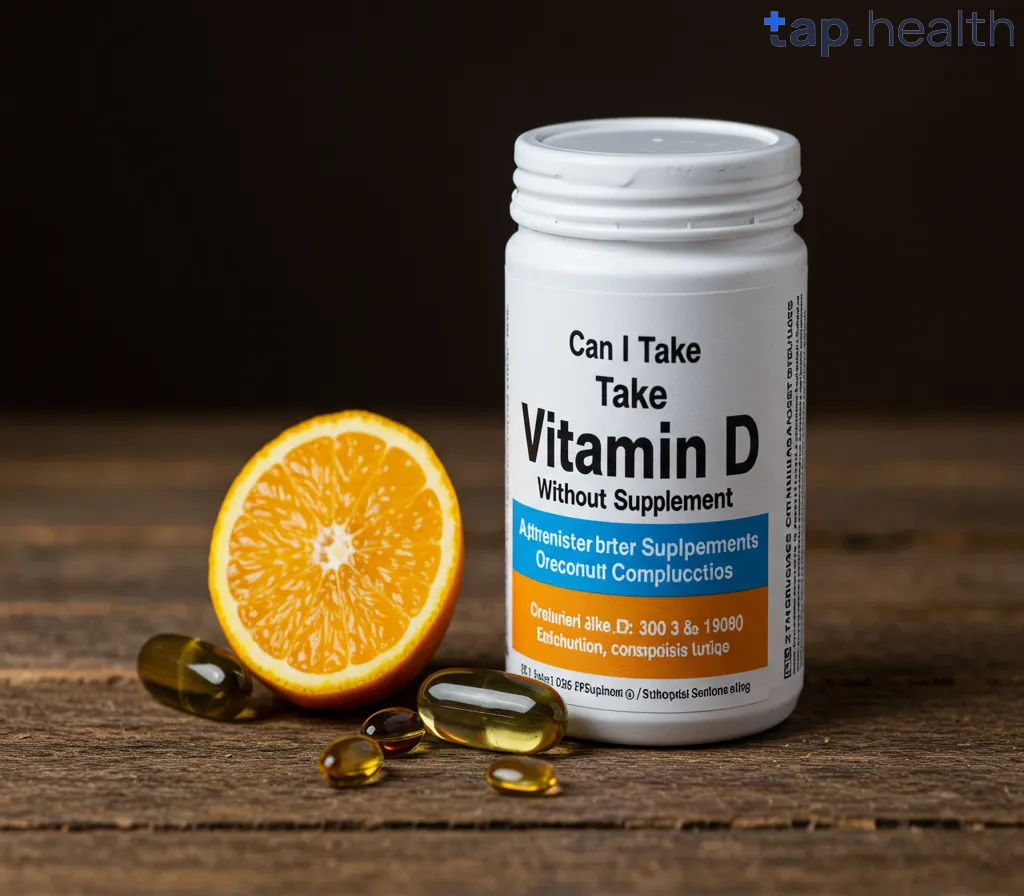Vitamin D is one of the most essential nutrients for the body. It helps in maintaining healthy bones, boosts the immune system, and supports overall health. Many people wonder if they can take Vitamin D supplements without consulting a doctor. After all, supplements are widely available over-the-counter, and it might seem easy to just add one to your routine.
However, the decision to take Vitamin D supplements should be made carefully, considering individual health needs, potential side effects, and risks. In this blog post, we’ll answer your questions about Vitamin D supplements, whether they are safe to take without a doctor’s recommendation, and when it’s important to consult with a healthcare provider.
What is Vitamin D?
Before diving into the question of whether you need a doctor’s approval for Vitamin D supplements, let’s first understand what Vitamin D is and why it’s important for your health.
Role of Vitamin D in the Body
Vitamin D is a fat-soluble vitamin that plays several critical roles in maintaining health. The two main forms of Vitamin D are D2 (ergocalciferol) and D3 (cholecalciferol), both of which help the body absorb calcium and phosphorus, two minerals vital for bone health.
Vitamin D also plays a role in:
- Immune system function – It helps the immune system fight off infections.
- Muscle function – It aids in the proper functioning of muscles.
- Mood regulation – Some studies suggest it can help in the regulation of mood and may prevent depression.
Natural Sources of Vitamin D
The best natural source of Vitamin D is sunlight. When your skin is exposed to UV rays, it produces Vitamin D naturally. However, depending on your location, lifestyle, and time spent outdoors, getting enough sunlight may not always be possible, especially in the winter months.
Other natural sources of Vitamin D include:
- Fatty fish (salmon, mackerel, tuna)
- Egg yolks
- Beef liver
- Fortified foods like milk, orange juice, and cereals
Can I Take Vitamin D Supplements Without Consulting a Doctor?
Yes, you can buy Vitamin D supplements without a prescription. However, whether you should take them without consulting a doctor depends on a variety of factors, such as your current health condition, diet, and existing Vitamin D levels.
Why People Consider Taking Vitamin D Supplements
There are several reasons why people might choose to take Vitamin D supplements without consulting a doctor:
- Limited Sun Exposure – People who live in areas with long winters or who spend most of their time indoors may not get enough sunlight, which is the primary natural source of Vitamin D.
- Dietary Deficiency – If you follow a strict vegan diet or have dietary restrictions, you may not be consuming enough Vitamin D through food sources.
- Bone Health – Many people take Vitamin D to improve bone health, especially as they age.
- Immune System Support – Some believe that Vitamin D can help boost the immune system, especially during the colder months.
When It’s Safe to Take Vitamin D Supplements on Your Own
In certain situations, it may be safe to take Vitamin D supplements without consulting a doctor:
- You have been diagnosed with a Vitamin D deficiency. If you have already had your Vitamin D levels tested and your doctor has recommended supplements, you can continue using the same dosage without further consultation.
- You live in areas with limited sunlight. If you live in a place with long winters or little sunshine, you might want to take Vitamin D supplements to compensate for the lack of natural sunlight.
- You are at risk for deficiency. If you know that you are at risk for low Vitamin D levels (e.g., you are older, have darker skin, or have certain health conditions), taking Vitamin D supplements can be a preventive measure.
The Recommended Daily Intake (RDI) of Vitamin D
The RDI of Vitamin D varies depending on age, sex, and life stage:
- Infants (0-12 months): 400 IU (International Units)
- Children (1-18 years): 600 IU
- Adults (19-70 years): 600 IU
- Adults (71+ years): 800 IU
- Pregnant and breastfeeding women: 600 IU
Many over-the-counter Vitamin D supplements contain between 1,000 to 2,000 IU per dose. This is generally safe for most people, but high doses can cause toxicity if taken for extended periods without proper guidance.
Can Taking Too Much Vitamin D Be Harmful?
Yes, taking too much Vitamin D can lead to Vitamin D toxicity, also known as hypervitaminosis D. This condition occurs when the body accumulates excessive levels of Vitamin D, which can lead to health problems. Vitamin D toxicity can result from taking large amounts of Vitamin D supplements over time.
Symptoms of Vitamin D Toxicity
- Nausea and vomiting
- Weakness and fatigue
- Confusion or disorientation
- High blood calcium levels (hypercalcemia)
- Kidney problems
The upper safe limit for Vitamin D supplementation is generally considered to be 4,000 IU per day for adults. Going above this dose without consulting a doctor can lead to serious complications. Therefore, it’s important to be mindful of how much Vitamin D you’re taking, especially if you’re using a supplement that contains higher doses.
How to Avoid Overdose
- Stick to the recommended daily dose (RDI) unless advised otherwise by a healthcare provider.
- Check the dosage on supplement bottles carefully.
- If you’re taking multiple Vitamin D supplements (e.g., in your multivitamin and a standalone Vitamin D supplement), make sure the total daily dose doesn’t exceed safe limits.
When Should You Consult a Doctor Before Taking Vitamin D Supplements?
Even though Vitamin D supplements are readily available over-the-counter, there are several circumstances in which you should consult a doctor before starting supplementation:
1. If You Have Health Conditions
If you have certain medical conditions, taking Vitamin D supplements could affect your health. It’s important to check with a healthcare provider before starting supplements if you:
- Have kidney disease or a history of kidney stones.
- Suffer from hypercalcemia (high calcium levels).
- Have sarcoidosis or tuberculosis, as these conditions can affect how your body processes Vitamin D.
2. If You Are Pregnant or Breastfeeding
While Vitamin D is essential for both the mother and the baby, high doses of Vitamin D should be avoided during pregnancy and breastfeeding unless recommended by a doctor.
3. If You Are Taking Other Medications
Vitamin D can interact with certain medications. For example, if you are taking:
- Steroids (like prednisone), which can interfere with Vitamin D metabolism.
- Thiazide diuretics, which can raise calcium levels in the blood.
- Anticonvulsants, which may lower Vitamin D levels.
It’s important to talk to your doctor about your Vitamin D needs before adding a supplement to your regimen.
4. If You Are Experiencing Symptoms of Deficiency
If you’re experiencing symptoms like fatigue, bone pain, muscle weakness, or frequent infections, it may indicate a Vitamin D deficiency. In this case, it’s best to consult a doctor for a blood test to measure your Vitamin D levels before starting supplementation.
What Are the Different Types of Vitamin D Supplements?
There are two main types of Vitamin D supplements available on the market:
- Vitamin D2 (Ergocalciferol): This form of Vitamin D is plant-based and often used in fortified foods.
- Vitamin D3 (Cholecalciferol): This form of Vitamin D is derived from animal sources and is generally considered more effective at raising Vitamin D levels in the body.
For most people, Vitamin D3 is the preferred form of supplementation due to its higher efficacy.
Frequently Asked Questions (FAQs) on Can I Take Vitamin D Supplements Without Consulting a Doctor?
1. Can I take Vitamin D supplements without a prescription?
Yes, Vitamin D supplements are available over-the-counter without a prescription. However, it’s important to ensure you are taking the correct dosage for your needs.
2. How do I know if I need Vitamin D supplements?
If you have limited sun exposure, follow a restrictive diet, or have certain health conditions, you may need Vitamin D supplements. A blood test from your doctor can confirm if you’re deficient in Vitamin D.
3. Can I take Vitamin D supplements if I am already taking a multivitamin?
Yes, but be cautious about the total dosage of Vitamin D you’re getting from both sources. Check the amount of Vitamin D in your multivitamin to avoid exceeding the recommended daily intake.
4. What is the best time of day to take Vitamin D supplements?
There is no specific best time of day, but it’s often recommended to take Vitamin D with a meal that contains fat, as Vitamin D is fat-soluble and better absorbed when taken with food.
5. How long should I take Vitamin D supplements?
If you’re deficient in Vitamin D, your doctor may recommend taking supplements for several months until your levels are normal. For general health, Vitamin D can be taken year-round, especially if you live in a region with limited sunlight.
Conclusion
While you can take Vitamin D supplements without consulting a doctor, it’s important to make informed decisions based on your individual health needs. If you’re deficient in Vitamin D, or if you are at risk for deficiency, supplements can help. However, always be cautious about dosage and potential interactions with other medications or health conditions. If in doubt, it’s best to consult a healthcare provider to ensure you’re using Vitamin D safely and effectively for your health.



